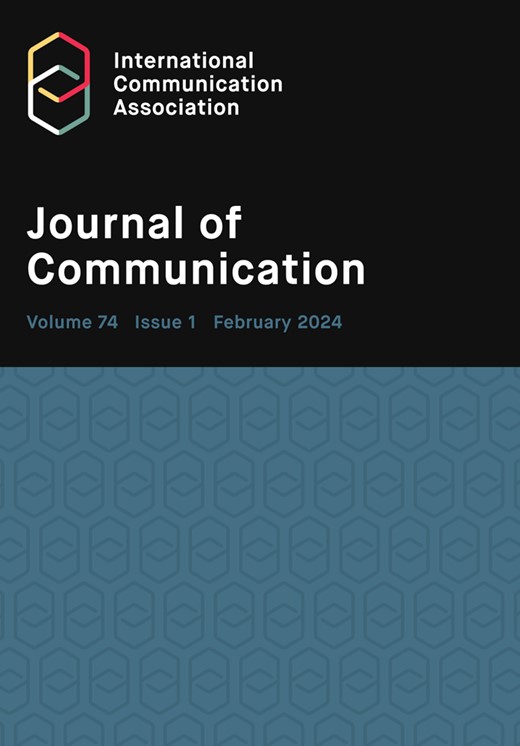An “Identity Turn” in political communication?: testing the relationship between media use and identity alignment in the United States
IF 5.5
1区 文学
Q1 COMMUNICATION
引用次数: 0
Abstract
Despite a rise in identity-centric communication scholarship, there is a lack of theory and evidence regarding how media use relates to the on-going alignment between political and social identities (i.e., identity alignment). We offer a framework for theorizing this dynamic and apply it to examine the relationship between Americans’ media diets and on-going psychological alignment between political and social identities in the United States (i.e., partisan social sorting). We use data from 33,690 American respondents from three national surveys: one longitudinal (1972–2020) and two fielded in 2020. There is evidence that identity alignment (i.e., sorting) has grown over time, but only among those who are most interested and attentive to politics and media. In 2020 surveys, we find no evidence that the frequency of media use was a significant predictor of social sorting. Instead, the composition of individuals’ media diets predicted the alignment between their social and political identities.政治传播中的“身份转向”?:美国媒体使用与身份认同的关系测试
尽管以身份为中心的传播学术有所兴起,但关于媒体使用如何与政治身份和社会身份之间的持续一致性(即身份一致性)相关的理论和证据仍然缺乏。我们提供了一个将这种动态理论化的框架,并将其应用于研究美国人的媒体饮食与美国政治和社会身份之间持续的心理一致性(即党派社会分类)之间的关系。我们使用了来自三次全国调查的33,690名美国受访者的数据:一次是纵向调查(1972-2020年),另两次是2020年的实地调查。有证据表明,随着时间的推移,身份一致性(即分类)有所增加,但这只发生在那些对政治和媒体最感兴趣和关注的人身上。在2020年的调查中,我们发现没有证据表明媒体使用频率是社会分类的重要预测因素。相反,个人媒体饮食的构成预测了他们的社会和政治身份之间的一致性。
本文章由计算机程序翻译,如有差异,请以英文原文为准。
求助全文
约1分钟内获得全文
求助全文
来源期刊

Journal of Communication
COMMUNICATION-
CiteScore
11.60
自引率
5.10%
发文量
41
期刊介绍:
The Journal of Communication, the flagship journal of the International Communication Association, is a vital publication for communication specialists and policymakers alike. Focusing on communication research, practice, policy, and theory, it delivers the latest and most significant findings in communication studies. The journal also includes an extensive book review section and symposia of selected studies on current issues. JoC publishes top-quality scholarship on all aspects of communication, with a particular interest in research that transcends disciplinary and sub-field boundaries.
 求助内容:
求助内容: 应助结果提醒方式:
应助结果提醒方式:


